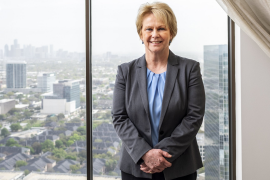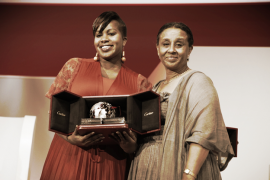Maria das Gracas Silva Foster is the first female CEO of Petrobras, the largest company in the Southern Hemisphere.
But Maria das Gracas Silva Foster was not born with a silver spoon in her mouth. She was born to a poor family and lived in shanties most of her young life. Not only did she grow up in repugnant surroundings, her family also had to deal with crimes, domestic violence, drug trafficking, diseases, and pollution. She lived in unsanitary conditions, yet that didn’t stop her mother from giving her all the love she needed to become a happy growing child.
At a very young age, Maria would collect recyclable trash that littered the street in exchange for money to pay for her school books. She had always expected that one day she’d stop attending school because of how poor they were, but admitted to never shying away from work. She attended the Fluminense Federal University in Niterói, near Rio.
The uncertainty about the future made her work harder for her studies. Eventually, she graduated with a Bachelor’s degree in chemical engineering in 1978 that year she joined Petrobras as an engineering intern in its exploration and production division. The following year, she earned her Master’s degree in nuclear engineering, and in 1999, she received her MBA in economics.
Maria served as manager at the Leopoldo Miguez de Mello Research and Development Center and the Transportadora Brasileira do Gasoduto Bolivia-Brasil. She also worked as the Executive Secretary of the Federal Government Program for PROMINP. She was the National Program for Biodiesel Production and Use’s Interministerial coordinator.
She was appointed as the Secretary of Oil, Natural Gas, and Renewable Fuels in 2003. In 2012, she became a member of the Petrobras Board of Directors and was chosen to be the CEO after a nomination from Dilma Rousseff herself.
Maria das Gracas Silva Foster was able to succeed and thrive in a place, not all men or women were able to bravely tread long enough—the side of the business. And she has her guts, her perseverance, and her good business sense to thank for all that.
She was commonly known by the diminutive “Graça” on account of her personable nature, and she was also occasionally referred to as “Caveirão,” a type of armoured car, for her work ethic. She added the English surname “Foster” upon her marriage to an expatriate British businessman.
Foster’s competence, style, and loyalty to the policies of Brazil’s Workers’ Party caught the eye of Dilma Vana Rousseff, who before being elected president in 2011 was federal minister of mines and energy and also chairwoman of the board of Petrobras.
Ms. Gracas Silva Foster served as a Board Member of Braskem S.A. She also served as a Member of the Board of Administration of Quattor Químicos Básicos S.A.
Source: worldsrichpeople.com/britannica.com




